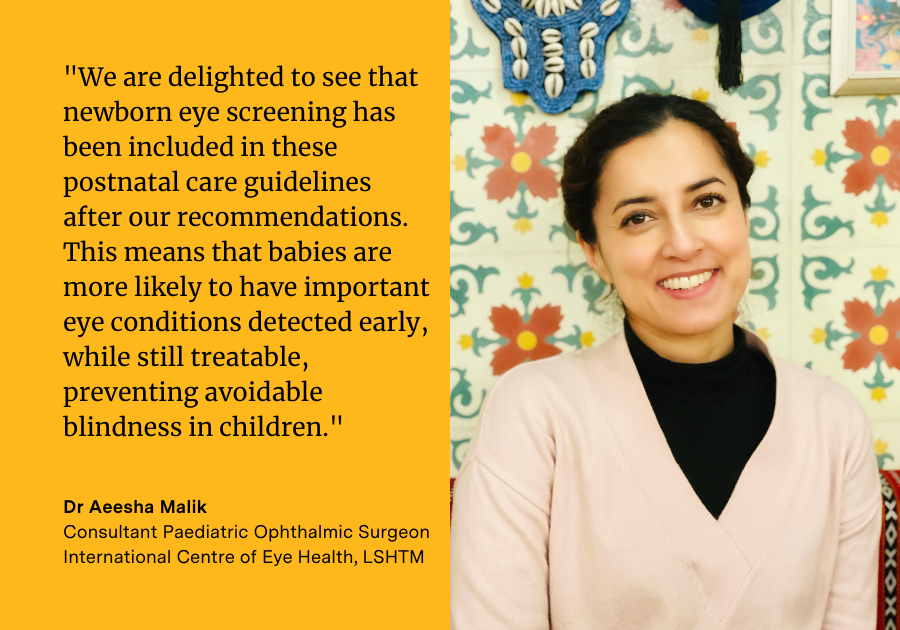
The postnatal period is a critical time for ensuring newborn and maternal survival and for supporting healthy development of the baby as well as the mother’s overall mental and physical recovery and wellbeing.
Worldwide, more than 3 in 10 women and babies do not currently receive postnatal care in the first days after birth - the period when most maternal and infant deaths occur. Meanwhile the physical and emotional consequences of childbirth – from injuries to recurring pain and trauma - can be debilitating if unmanaged but are often highly treatable when the right care is given at the right time.
In addition to addressing immediate health concerns, these first weeks after birth are crucial for building relationships and establishing behaviours that affect long-term infant development and health. The guidelines include recommendations for breastfeeding counselling - to aid attachment and positioning as breastfeeding is established - and to support parents in providing responsive care for their newborns.
In total, the new guidelines bring together over 60 recommendations that help shape a positive postnatal experience for women, babies and families. These include:
- High quality care in health facilities for all women and babies for at least 24 hours after birth, with a minimum of three additional postnatal checkups in the first six weeks. These additional contacts should include home visits if feasible, so that the health worker can support the transition to care in the home. In the case of a home birth, the first postnatal contact should occur as early as possible, and no later than 24 hours after birth;
- Steps to identify and respond to danger signs needing urgent medical attention in either the woman or the baby;
- Treatment, support and advice to aid recovery and manage common problems that women can experience after childbirth, such as perineal pain and breast engorgement;
- Screening of all newborns for eye abnormalities and hearing impairment, as well as vaccination at birth;
- Support to help families interact and respond to babies’ signals, providing them with close contact, warmth and comfort;
- Exclusive breastfeeding counselling, access to postnatal contraception and health promotion, including for physical activity;
- Encouragement of partner involvement, by being part of checkups, for instance, as well as providing support to the woman and attending to the newborn;
- Screening for postnatal maternal depression and anxiety, with referral and management services where needed.
The recommendations detail the minimum length of hospital stay after birth and provide guidance on discharge criteria, but note that the time needed will depend on individual women and babies, social context, birth experience, and any health concerns. Additional postnatal contacts are recommended for healthy women and newborns between 48 and 72 hours, between seven and 14 days, and during week six after birth. If health risks are identified, more contacts will likely be required, with treatment needed potentially well beyond the first six weeks.
Dr Aeesha Malik, Consultant Paediatric Ophthalmic Surgeon working at the International Centre of Eye Health (ICEH) at the London School of Hygiene & Tropical Medicine, who contributed to the development of the guidelines, said, "We are delighted to see that newborn eye screening has been included in these postnatal care guidelines after our recommendations. This means that babies are more likely to have important eye conditions detected early, while still treatable, preventing avoidable blindness in children."
This is the first global guidance for a positive postnatal experience. These recommendations complete a trilogy of guidelines from WHO for quality maternity care through pregnancy and during and after childbirth, centred on meeting the needs of all those who give birth and their babies. These uphold the rights to a positive healthcare experience, where people are treated with dignity and respect and can participate actively in healthcare decisions.
Our postgraduate taught courses provide health practitioners, clinicians, policy-makers, scientists and recent graduates with a world-class qualification in public and global health.
If you are coming to LSHTM to study a distance learning programme (PG Cert, PG Dip, MSc or individual modules) starting in 2024, you may be eligible for a 5% discount on your tuition fees.
These fee reduction schemes are available for a limited time only.
